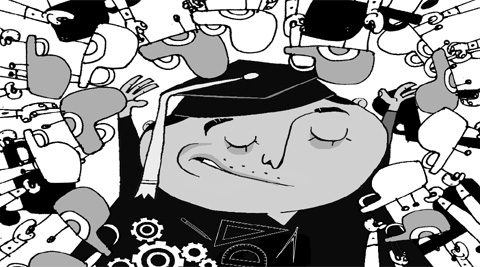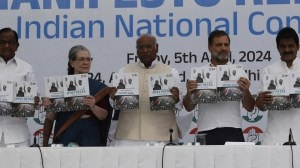- India
- International
After boom, it’s now fight for survival for tech institutes
Have the once sought-after engineering and management programmes lost their sheen?
 Data shows that out of 45,297 MBA/MMS seats in 2013 in Maharashtra, 17,740 could not be filled.
Data shows that out of 45,297 MBA/MMS seats in 2013 in Maharashtra, 17,740 could not be filled.
Empty seats pile up
With the unchecked proliferation of technical institutes in the last several years in Maharashtra, the state is again staring at thousands of empty seats this year across technical programmes. According to figures given by the Directorate of Technical Education (DTE), it received 1.06 lakh applications for approximately 1.5 lakh engineering seats this year, which means there are no takers for 44,000 seats. Further, while 131,987 seats are available with DTE under the central admission process (CAP), around 74,907 candidates have confirmed their admission after three rounds. The rest 57,080 are yet to be filled. Colleges can now fill their seats at the institute level.
Last year, seats remained vacant even in reputed engineering colleges in Mumbai like Veermata Jijabai Technological Institute (27), Sardar Patel Institute of Technology (19) and K J Somaiya College of Engineering (15). Several other colleges registered huge vacancies, ranging from 92 to 293.
“The number of students wanting to take admission into engineering colleges has plateaued, but new colleges keep coming up. This will result in vacancies as students have a multiplicity of choices and will opt for either a good college or a specific branch or a combination of both. It takes seven to eight years for a new institute to establish itself. With more supply and less demand, only those institutes that have good intentions and sustaining capability will survive,” says professor Deepak Phatak of IIT Bombay .
In management studies, DTE just got 27,223 applications this year for approximately 44,500 seats, which implies 17,277 vacancies even before the seat allotment process was initiated. The total number of seats available with DTE under CAP is 32,555 and after two rounds of seat allotment this year, DTE has managed to fill 12,224 seats, leaving 20,331 seats still vacant.

In MBA programmes, while there were vacancies ranging from 13 to 270 in 2013 too, some of the city’s management institutes were able to fill all seats. Among them are Jamnalal Bajaj Institute of Management Studies (JBIMS), K J Somaiya Institute of Management Studies & Research and SIES College of Management Studies. There were only a few empty seats last year at the institutes like Sydenham Institute of Management Studies, Research and Entrepreneurship Education (one), MET (two), Welingkar Institute of Management Development & Research (two) and Rizvi Institute of Management Studies & Research (four).
“The unchecked proliferation of technical and management institutes and the resulting increase in intake capacities without adequate planning and quality control will surely have detrimental effects on these professions. There is a cascading effect – more diploma holders are permitted to pursue degree programmes in order to fill vacancies, more management institutes are created to provide a channel to the increasing numbers of unemployable engineering graduates, many of whom join these programmes to improve their job prospects. This reflects very poorly on the quality of education,” says the report of a state-appointed committee, which was headed by G D Yadav, vice-chancellor of Institute of Chemical Technology (ICT), Matunga.
The report says that the All India Council for Technical Education or AICTE’s policy of expanding access to technical education has failed since there is “no control over quality and its scope is ambiguous”.
“A substantial increase in number of vacancies across all disciplines happened during the same period when AICTE started processing online applications for starting new institutes and variation in intake capacity in existing courses or institutes. Although online system appears a step towards e-governance and simplification of procedures and bringing transparency into the system, it allowed any individual or societies, without any background or credibility, to get approvals easily without verification of the accompanying of statistics, physical infrastructure, credibility of management and recruitment of qualified faculty. Notwithstanding the compulsory affidavit to be filed while submitting the relevant documents for existing institutes, the situation appears to have gone out of control and unworthy institutes assumed it as a blanket permission for increase in intake. Thus, intake went up substantially, which has led to vacancies,” it states.
Demad-supply mismatch
Across all technical disciplines, there has been a massive rise in student intake across the country, from 9,07,822 in 2007-08 to 22,36,743 in 2012-2013, reveal AICTE figures. In engineering, the numbers went up from 6,53,290 in 2007-08 to 17,61,976 in 2012-13. Similarly, in management, intake went up from 94,704 to 3,85,008 over the same period.
An analysis of engineering admission trends in Maharashtra shows that overall vacancies went up from 1.03 per cent in 2007-08 to 33.84 per cent in 2013-14. “From academic year 2006-07 to 2009-2010, the intake capacity in engineering increased by 36,364 in 108 new institutes and variation in intake capacity in existing institutes. Interestingly, vacancy percentage and actual numbers were marginally low.
In other words, during this period, the demand-supply equation was almost palatable. However, from 2010-11 to 2013-2014, there was a sudden spurt in the intake capacity, during which 94 new institutes were added in the state and variation in intake capacity existing institutes were permitted, leading to 67,181 additional seats. But during the four-year period, the number of students admitted remained almost the same, which adversely affected demand-supply equation. This would mean the additional institutes and variation in intake capacity of existing institutes were not at all justifiable,” says the report.
In management discipline, the report says that Mumbai and Pune account for most vacancies in MBA, MMS and PGDM, while Aurangabad has the least. Of the 516 institutes offering management courses in 2013-14, 252 institutes had vacancies, of which Mumbai (85) and Pune (91) accounted for 176.
“A large number of management institutes have mushroomed in Maharashtra, particularly in Mumbai and Pune regions. Ironically, in both cities, the number of institutes having vacancies of more than 35 per cent for 2013-14 and 2012-13 is very high. Overall, among 516 management institutes in Maharashtra, 241 institutes had vacancies ranging between 35 per cent and 90 per cent,” says the report.
Meanwhile, in 2011, AICTE lowered the eligibility criteria for engineering programmes from 50 per cent in Class 12 (in physics, chemistry and math or PCM) to 45 per cent for general category candidates and 40 per cent for reserved category candidates. Even this could not help bring down the vacancies significantly.
The same year, another trend started as AICTE began approving applications for closing down institutes. So, even as the AICTE continued giving new approvals, it simultaneously allowed several technical institutes with a large number of vacant seats to shut shop since 2011-12.
For the 2014-15 academic year, for instance, AICTE approved 256 new technical institutes across India, including 43 in Maharashtra. At the same time, it gave permission to 31 institutes across the country to close down, including four in Maharashtra. In Mumbai, two institutes were allowed to start and two permitted for closure.
“We need to go for periodical checking of institutes and grading them according to their quality of faculty and infrastructure, among others. Institutes can also look at placement support for students as well as employability aspects by providing them with requisite skills through summer training,” said Dayanand Meshram, joint director, DTE.
Multiple reports, no action
Another committee, comprising 15 members and headed by Meshram, has recommended in its report that the number of seats being approved be regulated and an upper limit be set, depending on the kind of facilities available at the institute and whether it is accredited or not.
The panel, which looked at why some colleges are facing vacancies to the tune of 35 per cent and above, have attributed the trend to students opting only for job-oriented courses and well-known colleges in cities.
“Students want to study only at popular and good colleges in Mumbai, Pune, Nashik, Aurangabad, Amravati and Nagpur. They don’t want admission into courses which cannot guarantee jobs. Courses that can lead to prompt campus interviews are high on their agenda,” says the report.
The other reasons cited for vacant seats are high fees at non-aided institutes, lack of transport to reach colleges in rural areas, lack of hostels and non-availability of experienced and quality teachers. The committee has said that with colleges coming up in other states, the number of outstation students have also gone down in Maharashtra.
Accordingly, to ensure quality control, the committee has suggested a limit or cap to the number of seats that should be approved, based on the quality of the institute, covering aspects like infrastructure, teaching staff and opportunities for students, among others.
The report says that if a particular course at an institute has been facing 35 per cent vacancies for the last three years, it could be allowed to switch to another course, provided its total strength does not exceed its intake limit. It has proposed surprise checks on colleges, especially those with 70 per cent vacancies. The reports calls for synergy between industry and placement cell at institutes and creating web portals to connect employers and potential employees (fresh graduates).
Following this report, the state set up another committee, which was headed by Yadav, to analyse the vacancies across professional courses in the state and suggest a remedial action plan to improve quality. Stating that an alarming 50.96 per cent of engineering institutes, 42.37 per cent of architecture, 58.21 per cent of management and 85.03 per cent MCA institutes had over 35 per cent vacancies in 2013-14, the committee said there was no need for new institutes or increased intake in existing institutes in Maharashtra for any professional programme.
The AICTE has, however, maintained it cannot stop giving approval to new colleges if they fulfill all the eligibility criterion. “We must also take into consideration the fact that these vacancies are in certain sectors and specific courses and not spread across in the same manner,” says AICTE chairman S S Mantha.
Data shows that out of 45,297 MBA/MMS seats in 2013 in Maharashtra, 17,740 could not be filled. Among institutes offering MBA/MMS courses in Mumbai, 79 were in urban areas and five in rural. The situation was opposite for Pune, where 138 were in rural areas and 44 in urban. According to the committee, the reasons for poor response to MBA courses are multiple, including industrial slow down, high fee structure ranging from Rs 60,000 to Rs 2 lakh, running of second shift and lack of qualified staff.
“Initially MBA courses were in great demand because of which AICTE created a new course called post-graduate diploma in management. The irony was that PGDM programme was directly offered to the management institutes by the AICTE, without any affiliation to any university, bypassing all academic norms. There was no control on the fee structure by any government. However, this course lost its sheen and many institutions closed the programmes and converted the intake into MBA programmes, thereby creating excess capacity. The time has come for management of these courses to rethink about their continuation,” the committee’s report says.
The report is also highly critical of the 7,288 combinations of institute-degree programmes in the state and says it indicates that an excessive number of such courses are on offer. “It is clear that there are too many substandard institutes with countless programmes, and considerable examples of deceptive nomenclatures about which the general public is unaware… The best institutes in the world as well as elite institutes in India do not offer more than 10 programmes, Surprisingly, AICTE has approved 234 degree and 399 diploma engineering courses. A cursory evaluation of these programmes suggests that there is no unification of degree programmes or their appendages, which has resulted is some specialised courses being converted to new programmes. In Maharashtra alone, there are currently 81 engineering programmes on offer,” says report.
During the 2013-14 academic year, for instance, electrical engineering, electronics and computer engineering contributed 36.13 per cent or 18,934 of the 52,400 vacant seats engineering seats in the state. This, says the report, could have arisen from the practice of naming the branches differently in order to receive approval from AICTE, “without paying any attention to graduates’ employability, availability of faculty and the existence of infrastructure”.
The committee has made several recommendations, which includes a mechanism to fix intake commensurate job opportunities and course relevance. It says only National Board of Accreditation or NBA-accreditated courses and institutes be allowed variation, provided there exists a market for graduates.
Recommending an immediate increase in hostel facilities, the report says that the government policy of reserving 30 per cent seats for girl students is also not reflected in hostel accommodation for girls. “In big cities, there is an acute shortage of hostels, whereas in rural areas, this problem is further complicated because of inadequate hostel facilities for girl students in particular. This is also a reason why some of the low performing institutes fail to attract students, leading to substantial vacancies,” it says.
While it calls for reduction in intake across disciplines, the report says no second shift should be allowed in any programme as it is “counter-productive” with poor teaching quality or overburdened teachers. “Institutes which have consistently failed to fill 30 per cent of the seats over the last years must go for 50 per cent reduction in sanctioned capacity, while those which have failed to admit less than 20 per cent over the last three years should be advised to close down the course,” it concludes.
However, the state government is yet to act on either of these two reports. “Why did the state go through the process of appointing a committee if it had no intention of considering the problems which have been highlighted and implementing the suggestions?” said a senior faculty of an engineering college, who did not wish to be named.
mihika.basu@expressindia.com
Apr 25: Latest News
- 01
- 02
- 03
- 04
- 05








































